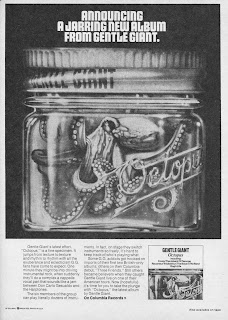 |
| [click to embiggen] |
By 1972, British rockers Gentle Giant were firmly entrenched in the mid-tier of progressive rock outfits, a step behind more successful chartbusters like Yes and Emerson, Lake & Palmer and not as highly regarded as critical darlings like King Crimson and Jethro Tull. Instead, they were kind of lumped in together with bands like Starcastle and the Strawbs, esteemed groups that enjoyed pockets of fandom but achieving only a modicum of commercial success. Although Gentle Giant would eventually transcend its cult band status to be considered one of the important and influential movers and shakers of 1970s-era prog-rock, with the release of their fourth album Octopus, they were just looking for a hit.
Although Octopus received uniformly positive reviews, with rockcrit handicappers predicting it to be the band’s breakthrough moment, Columbia Records’ advertising for the album did little to support Gentle Giant’s chart aspirations. Lauded for the virtuoso musicianship displayed by band founders the Shulman brothers (Derek, Phil & Ray), as well as guitarist Gary Green and drummer/multi-instrumentalist Kerry Minnear, the U.S. version* of Octopus sported an intriguing Charles White cover design that portrayed a stylized cephalopod captured in a jar. Columbia’s ad featured Berg’s striking cover front and center and larger than life, tagging it with a horrible pun (“a jarring new album”…really, what were you guys smoking/snorting to come up with a line like that?) and reducing the descriptive text to the fine print at the bottom of the page.
They’d have been better off reducing the size of the dominating graphic (which is reproduced again at the bottom of the ad) and including short, pithy, easy-to-read descriptions of the band and the album instead of the dense text that nobody bothered to dig through. By this time, the band’s fan base was pretty much set in stone, and Octopus only rose to #170 on the Billboard Top 200 before sinking. Although Gentle Giant would call it quits in 1980, they still had a couple of masterpieces up their sleeve and Octopus, along with the following year’s In A Glass House and 1975’s Free Hand would prove to be the cornerstones of the band’s enduring legacy.
* The U.K. version of Octopus featured typically cool Roger Dean cover artwork
Related Content: Gentle Giant's Octopus gets the Steven Wilson Treatment!

No comments:
Post a Comment